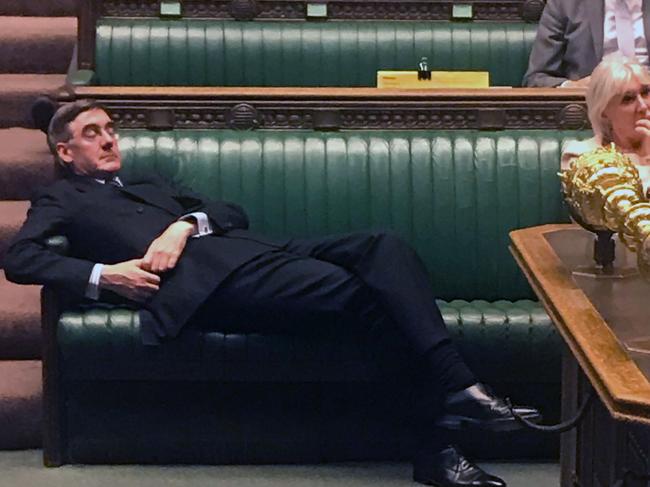How to speak Brexit: Five-minute guide
As Britain faces yet another Brexit crisis, here’s a five-minute guide to the key words and phrases you need to know.
World
Don't miss out on the headlines from World. Followed categories will be added to My News.
As British Prime Minister Boris Johnson faces yet another Brexit crisis, here’s a five-minute guide to the key words and phrases you need to know.
ARTICLE 50: Article 50 of the European Union’s Lisbon Treaty sets out the procedure for a country wishing to leave the bloc and imposes a two-year countdown to that country’s departure. Britain triggered the process on March 29, 2017, and was due to leave on March 29, 2019. Amid deadlock in Britain’s parliament the EU agreed a Brextension until April 12 and then until October 31.

BACKSTOP: The Brexit backstop is part of the withdrawal agreement between the EU and Britain. It’s an insurance policy designed to ensure there are no customs checks or other border infrastructure between the UK’s Northern Ireland and EU member Ireland after Brexit. The backstop says if no other solution is found, Britain will remain in a customs union with the EU in order to keep the Irish border open. Opposition to the backstop from pro-Brexit British politicians is the main reason the deal has been defeated in parliament.
BREXIT: A contraction of “British exit,” Brexit is Britain’s departure from the European Union. The UK joined the bloc in 1973, and held a 2016 referendum on its membership that was won by the “leave” side.
BREXITER/BREXITEER: A supporter of Britain’s exit from the European Union.

BREXTENSION: Brexit extension, a delay to Britain’s exit from the EU. This has been granted until October 31.
MORE NEWS
Rolling coverage: Johnson demands election
What the Brexit crisis means for Australia
CONFIRMATORY VOTE: A new referendum in which voters would be asked whether to approve any Brexit deal passed by parliament. The other option would be remaining in the EU, so this plan is mainly favoured by those who hope Brexit can be stopped. Also known by its supporters as a “people’s vote.”
CUSTOMS UNION: The European Union customs union makes the 28-nation bloc a single customs territory, with no tariffs or border checks on goods moving between member states. It also has common tariffs on goods entering the bloc from the outside.
DE-SELECT: A decision by a political party that the current elected politician will not run as the party’s candidate in the next election. Prime Minister Boris Johnson is threatening to do this to any Conservative politicians who support the opposition’s attempts to block a no-deal Brexit (see below).

EUROPEAN UNION: Formed in 1957 as the European Economic Community by France, West Germany, Italy, Belgium, the Netherlands and Luxembourg, the group is now a 28-nation bloc of more than 500 million people with substantial powers over member nations’ laws, economies and social policies.
HARD BREXIT: A Brexit that sees the UK cut many of its ties with the EU, including leaving the EU’s vast single market and customs union. Some supporters of the idea prefer the term “clean Brexit,” and say it will enable Britain to forge its own trade deals around the world.

INDICATIVE VOTE: Britain’s parliament has held a series of non-binding “indicative votes” on various Brexit outcomes as a way of finding out whether any have majority support. Politicians rejected every option, from leaving the EU without a deal to holding a new referendum on whether to remain.
LEAVER: A Briton who voted to leave the European Union. See also Brexiteer.
NO-DEAL BREXIT: If Britain and the EU do not finalise a divorce deal, Britain will cease to be an EU member without an agreement setting out what happens next. A no-deal Brexit would rip up the rules that govern ties between the UK. Many businesses say that would cause economic chaos.
PROROGATION: Suspending a session of parliament without dissolving it. Johnson’s move to do this will keep parliament away for five weeks in the run-up to the Brexit deadline. He says this is necessary to set out his government’s future policies, but opponents believe he is trying to reduce the amount of time available for debate and legislation that could block a no-deal Brexit.
REMAINER: A Briton who voted to stay in the European Union.
SINGLE MARKET: The EU’s single market makes the bloc a common economic zone in which goods and services can move freely with no internal borders or barriers.
SOFT BREXIT: A Brexit that sees the UK retain its close economic ties with the EU, including membership in the bloc’s single market and customs union.
WITHDRAWAL OF THE WHIP: A political party deciding that a politician does not represent it in parliament any more, effectively suspending that person from the party. Johnson is threatening to do this to any Conservative politicians who support the opposition’s attempts to block a no-deal Brexit.
WITHDRAWAL AGREEMENT/POLITICAL DECLARATION: In November 2018, Britain and the EU struck a two-part divorce agreement. It consists of a legally binding, 585-page withdrawal agreement setting out the terms of the U.K.’s departure, and a shorter, non-binding political declaration committing the two parties to close future ties. The agreement must be approved by the British and European parliaments to take effect, but Britain’s parliament has rejected it three times. Johnson has insisted it is unacceptable and is seeking to renegotiate it.
SOURCE: AP
Originally published as How to speak Brexit: Five-minute guide


